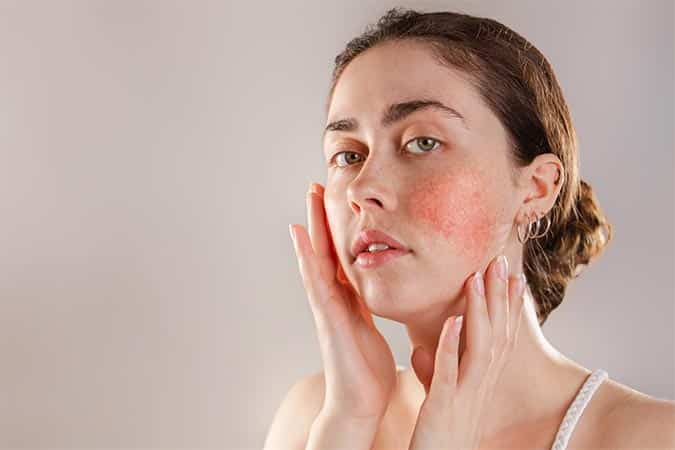What is Rosacea?
Rosacea is a skin condition that causes visible blood vessels and redness on the face. Small, red, pus-filled bumps, commonly referred to as “adult acne” may also occur. These symptoms may flare up for a while and then go away for a while. This condition can affect anyone but is more common in middle-aged women with light skin. Those with a family history of rosacea or smokers may also be more likely to develop this condition.
Common symptoms of rosacea include:
- Facial redness and broken blood vessels
- Flushing
- Swollen, red bumps, and pustules that may resemble acne
- Eye problems, including dry, irritated, swollen eyes or eyelids
- Enlarged/bulbous nose
There are a number of factors that trigger rosacea flare-ups, including hot drinks, spicy foods, alcoholic beverages, emotions, exercise, temperature extremes, sunlight or wind, cosmetic products, or drugs that dilate blood vessels.
Who is a Good Candidate for Rosacea Treatment?
Individuals who think they may have rosacea or those who have been diagnosed with rosacea and are experiencing uncomfortable or painful symptoms can benefit from rosacea treatment. The best way to determine the best treatment option for you is through a consultation with one of our dermatologists. Contact us today to get started!

Recommended Product
EltaMD UV Clear SPF 46
Oil-free EltaMD UV Clear helps calm and protect sensitive skin types prone to discoloration and breakouts associated with acne and rosacea. It contains niacinamide (vitamin B3), hyaluronic acid, and lactic acid, ingredients that promote the appearance of healthy-looking skin. Very lightweight and silky, it may be worn with makeup or alone. Choose from tinted and untinted formulas for use every day.
What to Expect During Rosacea Treatment?
While there is no cure for rosacea, there are treatments to control symptoms. These include:
Topical drugs: For mild to moderate rosacea, a cream or gel such as brimonidine or oxymetazoline may be prescribed to reduce redness by constricting the blood vessels. Other topical products such as azelaic acid, metronidazole, and minocycline may help to control the pimples caused by mild rosacea.
Oral antibiotics: These may be prescribed in low doses for moderate to severe rosacea with bumps and pimples.
Isotretinoin: This is an oral acne drug that is used to treat severe rosacea that doesn’t respond to other treatments. It helps to clear up the acne-like lesions that are caused by this condition.
Light-based therapy: Pulse dye laser (VBeam) treatments are used to eliminate blood vessels and reduce facial redness and flushing.
There are also lifestyle and home remedies that can be used for mild to moderate rosacea. These include identifying and avoiding triggers that cause flare-ups, using sunscreen with an SPF of 30 or higher daily, and using skincare products that do not contain skin irritants such as alcohol.
Rosacea FAQs
Can dehydration cause rosacea?
Can rosacea affect your eyes?
Can I get a facial if I have rosacea?
Can rosacea be a symptom of something else?
Can I get rosacea on my arms?
Following Rosacea Treatment
Following rosacea treatment, patients will experience an improvement in their symptoms and the appearance of their skin. Your dermatologist will instruct you on how to properly receive treatment, as well as how long treatment is needed for long-lasting or optimal results. Do not hesitate to contact our office regarding proper treatment practices or post-treatment questions.
Schedule a Consultation
To learn more about rosacea treatment options, contact HMGS Dermatology today to schedule a consultation with one of our dermatology providers. We will be happy to answer any questions that you may have regarding treatment or scheduling.

Get Started With A Visit!
Fill out the form below and we will reach out to you shortly to schedule an appointment.